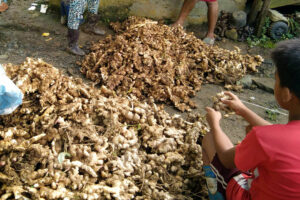Indonesia, Vietnam eyed as alternative sources of ginger
FARM GOODS importers have been asked to consider ordering ginger from Indonesia or Vietnam to ensure that the needs of the food industry are met with ginger from China still expensive, the Department of Agriculture (DA) said. “I’ve asked the importers to look for other sources other than China that have much cheaper prices. We […]

FARM GOODS importers have been asked to consider ordering ginger from Indonesia or Vietnam to ensure that the needs of the food industry are met with ginger from China still expensive, the Department of Agriculture (DA) said.
“I’ve asked the importers to look for other sources other than China that have much cheaper prices. We have identified Indonesia and Vietnam,” Agriculture Secretary Francisco P. Tiu Laurel, Jr. told reporters.
The Bureau of Plant Industry (BPI) projects ginger imports of 13,725 metric tons (MT) this year, based on the Sanitary and Phytosanitary Import Clearances (SPSICs) issued as of Oct. 3.
Ginger landed so far totaled 4,248 MT as of that date, with most imports from China.
“Ginger prices in China remain high because it is still not the harvest season. That is why the price of ginger in (the Philippines) is high, because we don’t have that much supply,” Mr. Laurel added.
The retail price of ginger in Metro Manila markets was reported at between P140 and P300 per kilogram, according to DA price monitors as of Oct. 8.
Separately, Agriculture Assistant Secretary and Spokesperson Arnel V. de Mesa said that the BPI had issues SPSICs for Vietnamese and Indonesian ginger amounting to 50 MT each.
“Most of our imports are from China. When they increase prices, it will definitely affect us. We’re opening up Vietnam and Indonesia so that at least we don’t have only one source,” Mr. De Mesa told reporters.
He said ginger imports from Vietnam and Indonesia are expected to arrive in the next two months.
He cited solid demand for ginger from makers of herbal tea and turmeric tea.” — Adrian H. Halili























